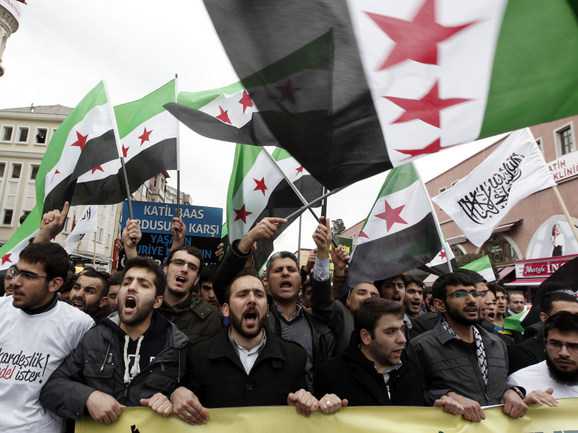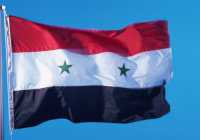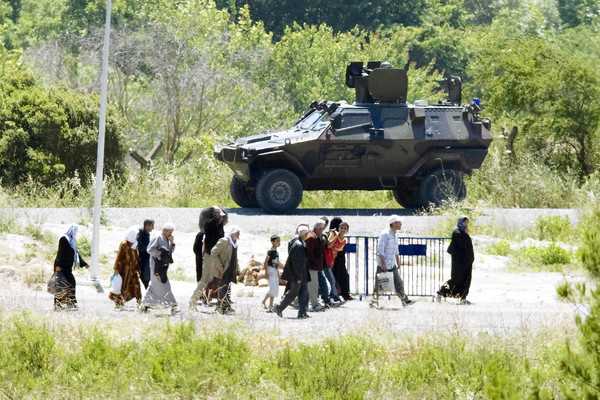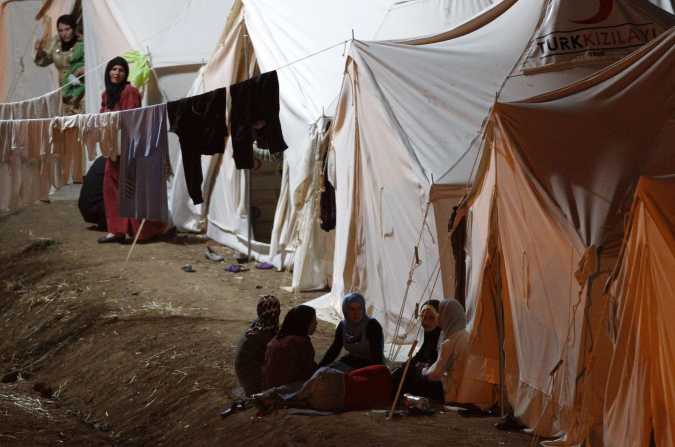Turkey building giant tent city as Syrian refugees swell
* 14 Syrian officers including two colonels crossed to Turkey
* Tent city will accommodate up to 15,000 people
* EU extends sanctions against Syrian and Iranian officials
 APAYDIN: A giant tent city was springing up on Turkey’s frontier with Syria as concerns mounted Friday over a massive influx of refugees after Syrian tanks rolled into the border zone.
APAYDIN: A giant tent city was springing up on Turkey’s frontier with Syria as concerns mounted Friday over a massive influx of refugees after Syrian tanks rolled into the border zone.
Some 150 workers toiled in scorching heat by the village of Apaydin, some 10 kilometres (six miles) from the frontier, scrambling to expand a Red Crescent camp where more than 200 tents have already been erected. Another 1,000 tents will be ready in a week on the cleaned and levelled plot of 300 hectares (750 acres), claimed from pasture land, “in case of a massive influx” of Syrians, said village headman Omer Cagatay.
On Thursday, Syrian security forces backed by tanks entered a border zone where thousands of people have massed to escape bloodshed, triggering a new exodus across the border.
The Turkish authorities said Friday that 1,578 people had poured in, bringing to 11,739 the total number of Syrians sheltering in camps in the Turkish border province of Hatay. The latest wave included Syrians who had flocked to the border but hesitated to cross to Turkey, braving squalid conditions in the open air or in makeshift shelters of branches and plastic sheets, with scarce food and water.
The arrival of President Bashar al-Assad’s forces finally impelled them to seek refuge in Turkey, overriding their concerns of an uncertain future on foreign soil. Members of the Syrian security forces have allegedly joined the fleeing Syrians. Speaking to AFP by telephone, a Turkish smuggler in contact with relatives on the Syrian side said that14 Syrian officers, among them two colonels, crossed to Turkey on Friday from the border village of Khirbet al-Joz, which the Syrian army overran the previous day.
The tent city at Apaydin will be the largest, with a capacity to accommodate up to 15,000 people, Cagatay said. A worker said they had erected a two-kilometre fence around the camp. “We want to be ready,” another worker said, busily hammering a support pole for a tent designed to house a family of at least six.
Ankara has already allocated $2.3 million (1.6 million euros) for the refugees and assured that no one seeking shelter in Turkey will be turned away. “We do not know how many Syrians could come but we are prepared for any possibility,” said Emre Manav, the Turkish foreign ministry’s local coordinator.
The head of the Turkish Red Crescent, Tekin Kucukali, has said that his agency is in theory able to sustain up to 250,000 people. Such an eventuality however “is something that we absolutely do not desire,” a Turkish diplomat said on condition of anonymity.
The Apaydin camp offer as much comfort as possible to the refugees: toilets, showers, cinemas, playgrounds for children, a small mosque, a field hospital, recreation areas and even a wedding hall. The piping system is almost ready and running water is to come soon to the tent city, equipped with floodlights for illumination.
The worst-case scenario for Turkey, observers say, would be a spillover of unrest to Aleppo, Syria’s second-largest city and economic hub, which lies only 90 kilometres (55 miles) from the Turkish border. “Aleppo is a bastion of the (Syrian) regime. If the revolt wins over the city, that would mean a humanitarian disaster,” said Nebil Al-Said, a Syrian dissident long based in Hatay. afp
Meanwhile, European Union extended sanctions against Syrian and Iranian officials. The local government in Turkey’s Hatay province said the new wave of refugees who crossed the border on Thursday, mostly from makeshift camps just inside Syrian territory, brought the total number now registered in Turkish camps to 11,739.
On Friday the European Union announced extended sanctions on Syria, including three commanders of Iran’s Revolutionary Guard accused of helping Damascus curb dissent. Syria denies Iran has played any role in tackling the unrest.
According to the EU’s Official Journal, the Iranians were Major-General Qasem Soleimani and Brigadier Commander Mohammad Ali Jafari of the Revolutionary Guard, and the Guard’s deputy commander for intelligence, Hossein Taeb. Four Syrian officials were also targeted, bringing to 34 the number of individuals and entities on the list which already includes Assad and his top officials.
The United States, which has also imposed targeted sanctions on Syrian officials, said the reported Syrian army move to surround and target the town of Khirbat al-Joz just 500 metres (yards) from the Turkish border was a worrying new development. agencies
via Daily Times – Leading News Resource of Pakistan – Turkey building giant tent city as Syrian refugees swell.
 NICOSIA — The regime of President Bashar Assad has acknowledged increasing attacks on its military believed aided by neighboring Turkey.
NICOSIA — The regime of President Bashar Assad has acknowledged increasing attacks on its military believed aided by neighboring Turkey.





